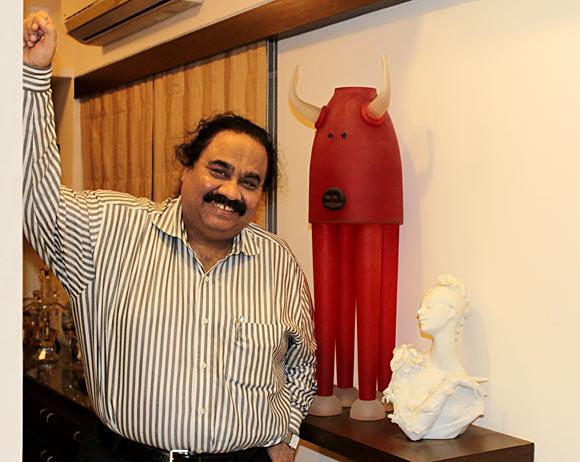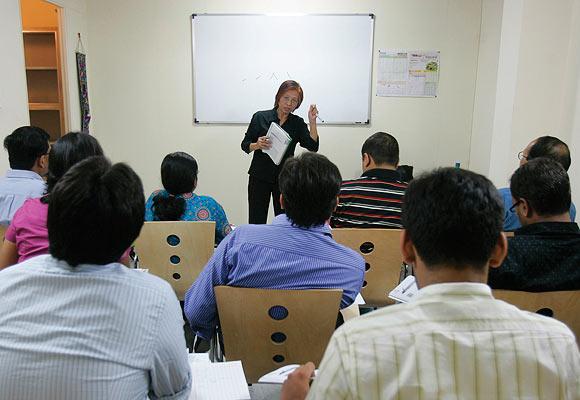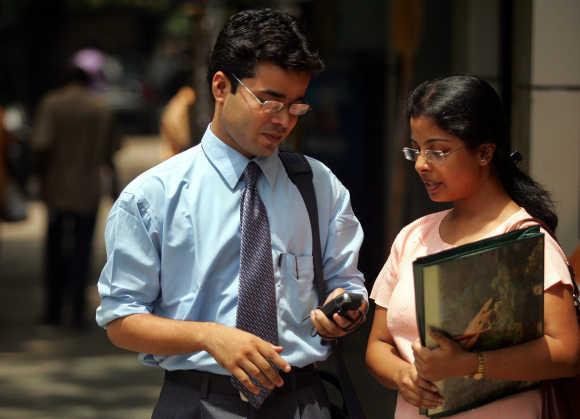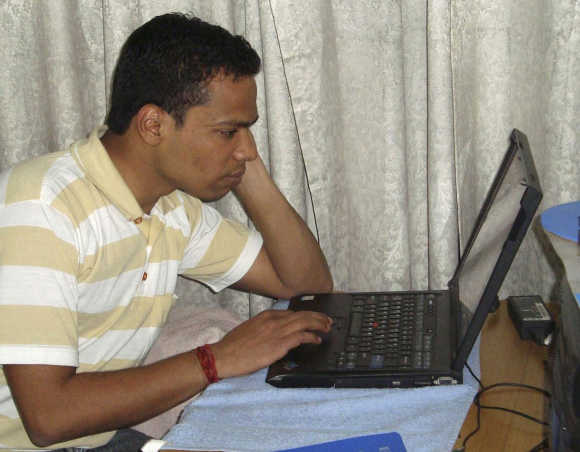 | « Back to article | Print this article |
'Nine out of 10 engineers never wanted to be one'
Marked by their lack of professionalism, the growing inability of young Indian graduates to perform well at job interviews inspired Sandeep Goyal to write his recent book You're Hired! Read on for interesting insights from the adman-turned-author on how parents and aspiring professionals can contribute towards improving the quality of employable graduates in our country...(Click here to read an excerpt from the book)
Sandeep Goyal is a man who dons many hats.
He has an extreme opinion on everything and anything that matters, which also makes him 'peculiarly selective'.
In his professional career spanning over three decades, he must have interacted with and interviewed hundreds of candidates young and old, but he confesses that he's hired only the ones he found "interesting" and "fit for the role".
The former head of advertising agency Rediffusion and channel Zee TV is also an entrepreneur; he is currently chairman of Mogae Digital, a digital advertising agency and jointly produces a show with chef Sanjeev Kapoor on lifestyle channel Food Food.
An MBA from the Faculty of Management Studies, Delhi and a gold medalist degree holder in English literature from Panjab University, Chandigarh, Goyal has had his fair share of experience with ill-informed graduates and creative professionals.
But it was only two years ago, when he sat down to a chat with his 18-year-old daughter Carol, who was preparing for a pre-admission interview in a bid to get into law school, that he realised a college education doesn't really equip young professionals to write a good CV or face an interviewing panel.
Sensing the need to educate youngsters and ready aspiring professionals for the corporate world, Goyal compiled his observations from various interviews and interactions and shared it with Carol and her friends for feedback.
That's how his latest book You're Hired!, co-authored with his daughter, came about.
The work presents 12 "true-to-life job interviews" from across domains like media, finance and education, and offers interesting insights into what works and what doesn't from an employer's point of view.
Goyal says it is targeted at young and aspiring professionals who have "limited exposure to the corporate world and succumb to free information off the web."
In the following pages, he shares his views on India's unemployability problem and offers plausible suggestions to remedy the situation.
Please click NEXT to continue reading...
'Today it is simpler to get into a university overseas than into an IIM or an IIT'
Where do you think Indian graduates are going wrong with regards to the job search process?
I recently read this report that more than 20 per cent of the seats in India's engineering colleges are going vacant. The same is happening in management schools.
At one end we have made our lives tougher by setting the bar really high and being competitive; today it is simpler to get into a university overseas than into an IIM or an IIT.
So we have these top-end colleges that are highly sought after and admit only the best students into their campuses.
On the other hand, you have students scoring between 35 and 45 per cent who are chased by several institutes that give admission to anyone for any course and at the end of it all hand them degrees. Many of those kids are not fit for the jobs that they think they are eligible for; the curriculum, the quality of education, faculty and overall standard of whatever they are undergoing in the garb of education leaves much to be desired.
So, if we are talking of these kids -- who were basically not even eligible for the further education they chose to undertake -- no matter what book you write, or whatever training you put them through, the situation is not going to improve.
What we are and should be talking about at the end of the day is good (read talented) kids applying for good jobs. If you are a hopeless guy, there is nothing the educational institutes or corporates can do for you.
What then, according to you, is the leading cause of unemployability?
There are a lot of things I'd blame for this unhealthy trend.
Up until a few years ago, if you couldn't pursue engineering after Class 12, you could always enroll in the Industrial Training Institutes.
They'd train you, impart specialised job skills and give you a diploma, after which you could apply for a job and eventually become a supervisor, if not an engineer. You'd be a blue or grey-collared employee, but a skilled one at that.
Today, however, the ITIs don't get enough students, because they are lured by new engineering colleges that promise to make them engineers.
Ten years ago, even a kid who got 33 per cent in Class 10 could go to an ITI and become a technician or a plumber.
The fact of the matter is that if you got 33 per cent, maybe you did not get the right educational exposure, or you were not academically bright, but at least you stood a good chance of becoming a skilled plumber.
Today, those same kids are going to an NIIT because they teach programming, which according to many is a better career option than plumbing.
Frankly, as long as you pay them the fee, NIIT doesn’t give a damn about your career. They will give you some form of diploma or degree certificate at the end of six or eight months. They are not exercising any quality control.
Have you ever heard of anyone who has enrolled in a course at NIIT and failed? It's a commercial get-ahead venture, NIIT being just an indicator of similar training institutes in our country.
At the end of the day, the student who was destined to be a plumber or a skilled technician ends up aspiring to be a programmer.
In the process, we have not only lost good programmers, we have also lost good plumbers. So you have problems at both ends.
'At the end of the day, the kids come out of the institute either half-baked or unbaked'
Who is to be blamed for this current scenario, the students or their parents?
According to me, both parents and students have unrealistic aspirations.
In the mind of the student, s/he is an MBA -- as qualified as those who graduate from, say, IIM-Ahmedabad. What they fail to realise is that if only 200 out of 10 lakh students go to study at an IIM, there has to be something dramatically different and superior about those candidates.
Someone who scores in the bottom one per cent of such a competitive test has to be realistic about his/her aspirations.
At the ad agency where I used to work, we've had MBAs willing to join us for Rs 25,000 per month, and then IIM graduates who were not willing to work for less than Rs 2.5 lakh a month. You can't compare the two and that's where the gap comes in.
And we don't have the courage or the system where we can tell these kids that the first decision they made was wrong. It gets worse, because nobody tells the parents that what they are encouraging their kids to pursue is unfair, either.
At the end of the day, the kids come out of the institute either half-baked or unbaked.
In fact, you can easily motivate somebody who's scored 80 per cent to score 90 per cent, but it's a challenge for a candidate who's scored 30 per cent to aim for 35 per cent.
Why are recruiters not ready to hire students straight out of college?
The recruiter has some basic expectations of a graduate.
I feel very bad for students who are engineers on paper, but cannot speak two sentences fluently in English.
I am not saying that knowing or speaking English is a great thing, but it's a basic skill you'd expect from a candidate who has done engineering or is an MBA.
If you are an MBA and cannot have a polite conversation in English with a client, what will I hire you for?
'When you say 'I'm friendly, ambitious, passionate' etc in your CV, you have to validate that with examples'
What are the qualities recruiters look for in candidates applying for an entry-level position?
Barring some technical skills that are specific to a job position, most employers want to know how good/bad a candidate you are for the organisation.
They want to find out how well you conduct yourself, whether you are a team player, whether you have communication skills etc.
They want to know whether you can perform under pressure.
Also, when you say 'I'm friendly, ambitious, passionate' etc in your CV, you have to validate that with examples. For example: 'I have done THIS, hence I have THIS quality.'
Can you recommend some books for young professionals?
There is this book Horse Sense by marketing gurus Al Ries and Jack Trout; they wrote only one book and every bright kid must read that book. It explains a very simple logic: Everything in life is a horse and the key to success is finding a horse to ride.
For example, when you hire someone for your organisation, you have to believe that s/he is the best person for the job and that this person will go places. So each time that this employee succeeds, you add your name to his/hers and also become successful.
Speaking in terms of bosses, when he's director you'll be managing director, when he's chairman, you'll be chairman emeritus -- and the story continues.
In many ways this book teaches you how to strategise for career success.
Which sectors, according to you, will provide young Indians with jobs in the next five to ten years and why?
I think India is already heading into a service economy.
In his book The Second Wave, Alvin Toffler shared an interesting observation; he says that 4/5ths of the earth is water and with increased civilisation, land will become scarce, so anything to do with water or the sea will flourish. It's a perspective, but has good probability.
Also, according to Toffler, the one thing that will never be out of demand is food. So as the economy prospers, there will be a demand for professionals in food and catering services.
A lot of people may not like to hear this, but pundits are in short supply -- ask your friends or relatives who live abroad and they will tell you how they are willing to pay any amount of money to get a good pundit.
So if you are smart enough to look around, you can identify these as opportunities.
What career advice do you have for young professionals?
My simplest advice to them is: Do what you like.
I've always felt that of every ten engineers that graduate, nine never wanted to be an engineer in the first place. So I feel good when I meet candidates who make alternate choices and stick by them.
I wish there were more kids who wanted to be chefs, lawyers or anything other than the predictable engineers, CAs and MBAs. The latter are important, but there is a serious dearth of professionals in every other sector. For one chef, there are 1,000 engineers.
When everybody zigs, if you zag, chances are you will have better opportunities in store.
I don't know if you are aware of 'actuaries' -- they are niche professionals who evaluate risks and work in the financial security sector. As of today there are very few actuaries in the country, so if you qualify as one, the world is looking for you.
On the flip side, only if an actuary dies does someone replace him. So be careful when you're making adventurous career choices.



